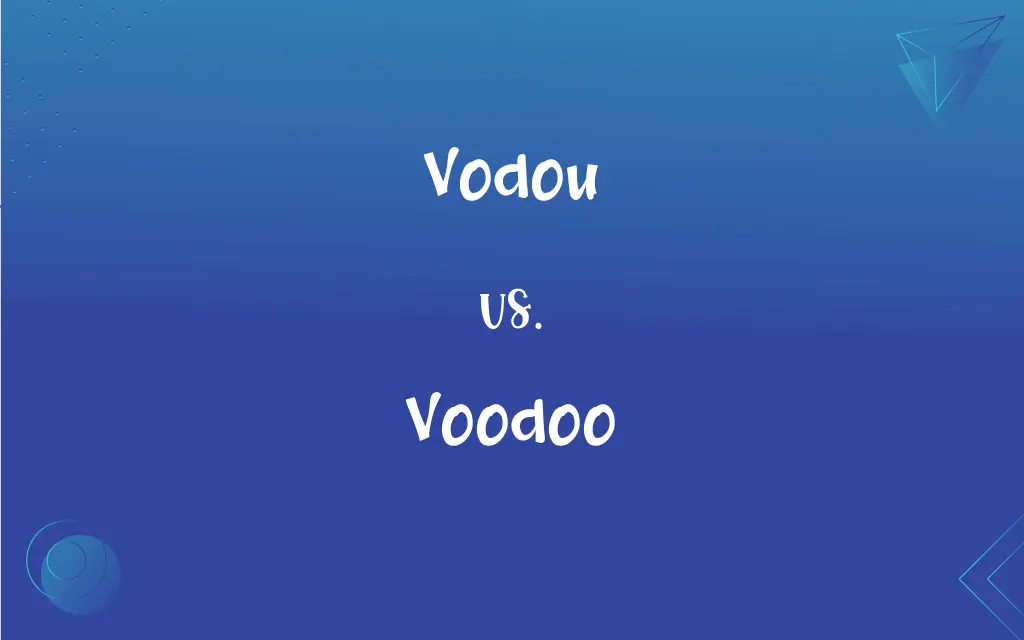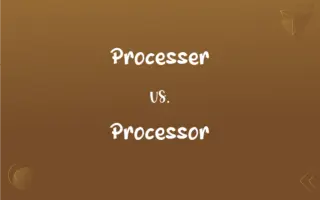Vodou vs. Voodoo: What's the Difference?
By Aimie Carlson || Updated on May 22, 2024
Vodou is a Haitian religion blending African, Indigenous, and Catholic elements, while Voodoo is a Westernized term often misrepresenting Vodou with sensationalist stereotypes.

Key Differences
Vodou is a religion originating in Haiti, deeply rooted in African traditions, Indigenous beliefs, and elements of Catholicism. Practitioners, known as Vodouisants, honor spirits called Lwa, engage in rituals, and perform ceremonies to seek guidance, healing, and protection. Voodoo, on the other hand, is a term often used in popular culture and media to describe a sensationalized and inaccurate version of Vodou. This portrayal tends to focus on dark magic, zombies, and curses, which misrepresents the true nature and practices of Vodou.
The spelling "Vodou" reflects a more accurate representation of the Haitian religion and its cultural significance. It encompasses the rich history and spiritual practices that are integral to the lives of its adherents. "Voodoo," however, is frequently used pejoratively or sensationally, often stripping away the authentic aspects of Vodou and replacing them with fictional elements designed to evoke fear or curiosity. This misrepresentation can lead to misunderstandings and prejudices.
Vodou emphasizes community, healing, and respect for ancestors and spirits. Its rituals are complex and involve music, dance, and offerings. Vodou's sacred practices are vital for maintaining the spiritual balance and well-being of individuals and communities. In contrast, Voodoo, as depicted in films and books, tends to highlight mystical and supernatural aspects, often ignoring the religion's true principles. This skewed portrayal contributes to a skewed perception of Vodou as mysterious or malevolent.
Comparison Chart
Origin
Haiti
Western misrepresentation
Cultural Roots
African, Indigenous, Catholic elements
Popular culture and media stereotypes
ADVERTISEMENT
Spelling Variation
"Vodou"
"Voodoo"
Authenticity
Represents true religious practices
Sensationalized and inaccurate portrayal
Focus
Spiritual guidance, healing, community
Dark magic, zombies, curses
Vodou and Voodoo Definitions
Vodou
A religion with deep cultural and historical roots in Haiti.
Vodou has played a significant role in Haitian culture for centuries.
Voodoo
A sensationalized portrayal focusing on dark magic and curses.
The book's depiction of Voodoo is filled with myths and inaccuracies.
ADVERTISEMENT
Vodou
A Haitian religion blending African, Indigenous, and Catholic traditions.
Vodou ceremonies often involve music, dance, and offerings to the Lwa.
Voodoo
A Westernized term often misrepresenting Vodou.
Movies often depict Voodoo with exaggerated and fictional elements.
Vodou
A spiritual practice that honors spirits and ancestors.
Practitioners of Vodou seek guidance and healing from the spirits.
Voodoo
A distorted version of Vodou seen in popular culture.
Voodoo is frequently misrepresented as a form of black magic.
Vodou
A system of beliefs focusing on the well-being of the community.
Vodou rituals are essential for maintaining harmony among the people.
Voodoo
A term often used pejoratively or sensationally.
The show's portrayal of Voodoo fails to respect the true Vodou religion.
Vodou
A faith that integrates various elements from different traditions.
Vodou combines aspects of African, Indigenous, and Catholic practices.
Voodoo
A religion of West African origin practiced chiefly in Haiti and other Caribbean countries, based on animism, magic, and elements of Roman Catholic ritual, and characterized by belief in a supreme God and a large pantheon of local and tutelary deities, deified ancestors, and saints, who communicate with believers in dreams, trances, and ritual possessions. Also called vodoun.
Vodou
Religion
Voodoo
A practitioner, priest, or priestess of voodoo.
Voodoo
Deceptive or delusive nonsense.
Voodoo
To place under the influence of a spell or curse; bewitch.
Voodoo
Of or relating to the beliefs or practices of voodoo.
Voodoo
Based on unrealistic or delusive assumptions
Voodoo economics.
Voodoo
Any of a group of related religious practices found chiefly in and around the Caribbean, particularly in Haiti and Louisiana.
Voodoo
The spiritual beliefs of the Ewe/Fon of West Africa, practiced chiefly in Benin and in the south of Togo.
Voodoo
(pejorative) Any sort of magical or irrational approach to a problem.
I want a real explanation, not this statistical voodoo.
Voodoo
(dated) One who practices voodoo; a native sorcerer.
Voodoo
To bewitch someone or something using voodoo
He claimed his neighbor had voodooed him.
Voodoo
See Voodooism.
Voodoo
One who practices voodooism; a negro sorcerer.
Voodoo
Of or pertaining to voodooism, or a voodoo; as, voodoo incantations.
Voodoo
A charm superstitiously believed to embody magical powers
Voodoo
A religious cult practiced chiefly in Caribbean countries (especially Haiti); involves witchcraft and animistic deities
Voodoo
Bewitch by or as if by a voodoo
Voodoo
An inaccurate depiction that can lead to stereotypes.
Many people have misconceptions about Voodoo due to media portrayals.
FAQs
What is Vodou?
Vodou is a Haitian religion blending African, Indigenous, and Catholic elements.
How is Vodou different from Voodoo?
Vodou is an authentic religion, while Voodoo is a Western misrepresentation often focused on dark magic.
What are the main beliefs in Vodou?
Vodou beliefs include honoring spirits, ancestors, and seeking spiritual guidance and healing.
What role do spirits play in Vodou?
Spirits, known as Lwa, are central to Vodou, providing guidance, protection, and healing.
Are Vodou and Voodoo practiced differently?
Vodou is practiced as a religion with rituals and ceremonies, while Voodoo as depicted in media is largely fictional.
Where did Vodou originate?
Vodou originated in Haiti, with roots in African traditions and influences from Indigenous and Catholic practices.
How has Vodou influenced Haitian culture?
Vodou has significantly influenced Haitian culture, art, music, and social practices.
Why is Voodoo often misunderstood?
Voodoo is misunderstood due to its sensationalized portrayal in media and popular culture.
Do Vodou practitioners use dolls for curses?
The use of dolls for curses is a myth; Vodou dolls are used for various symbolic purposes.
How does Vodou emphasize community?
Vodou rituals and ceremonies often involve the entire community, fostering unity and support.
Is there a connection between Vodou and Catholicism?
Yes, Vodou incorporates elements of Catholicism, including saints and religious imagery.
What are the misconceptions about Voodoo?
Common misconceptions include its association with dark magic, zombies, and curses.
Can Vodou be practiced outside of Haiti?
Yes, Vodou is practiced by Haitian diaspora communities around the world.
Is Voodoo a real religion?
Voodoo, as commonly portrayed, is not a real religion; it is a distorted version of Vodou.
How has popular culture impacted the perception of Voodoo?
Popular culture has often distorted Voodoo, leading to stereotypes and misunderstandings.
Is Voodoo ever used respectfully in media?
Rarely, as most media portrayals focus on sensational aspects rather than accurate representations.
How can one learn more about Vodou?
To learn more, seek out reputable sources, books by scholars, and engage with practitioners and communities respectfully.
What are common practices in Vodou ceremonies?
Common practices include music, dance, offerings, and rituals to honor the Lwa.
Why is Vodou often associated with magic?
Vodou's association with magic comes from misrepresentations and myths perpetuated by media.
What is the role of a Vodou priest or priestess?
Vodou priests (houngans) and priestesses (mambos) conduct rituals, offer guidance, and serve the community.
About Author
Written by
Aimie CarlsonAimie Carlson, holding a master's degree in English literature, is a fervent English language enthusiast. She lends her writing talents to Difference Wiki, a prominent website that specializes in comparisons, offering readers insightful analyses that both captivate and inform.
































































